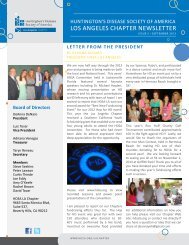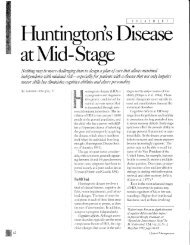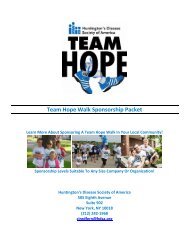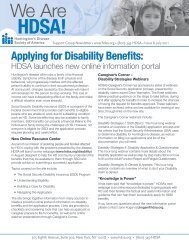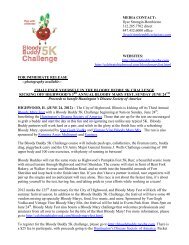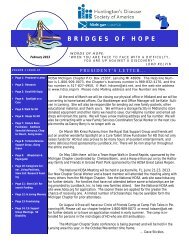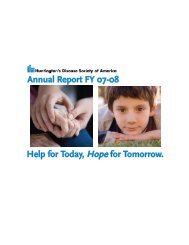Understanding Behavior in HD.final.8-18-05 - Huntington's Disease ...
Understanding Behavior in HD.final.8-18-05 - Huntington's Disease ...
Understanding Behavior in HD.final.8-18-05 - Huntington's Disease ...
You also want an ePaper? Increase the reach of your titles
YUMPU automatically turns print PDFs into web optimized ePapers that Google loves.
17<br />
A RECIPE FOR CAREGIVER SURVIVAL<br />
1) Use the team approach: enlist the help of others. The more players on the team, the better. Put an<br />
announcement <strong>in</strong> the church bullet<strong>in</strong> or the local paper. The local girl or boy scouts can adopt you to<br />
help run errands, rake leaves, shovel snow or whatever other help you may need. Take the <strong>in</strong>itiative to<br />
assign some tasks to family members and friends—you’ll soon realize which <strong>in</strong>dividuals are good team<br />
players and which ones are not. Allow<strong>in</strong>g others to do easier tasks can leave you more energy for the<br />
more difficult tasks.<br />
2) Plan time <strong>in</strong> your schedule for activities that you enjoy. Ma<strong>in</strong>ta<strong>in</strong> this schedule and make it a priority.<br />
Some caregivers jo<strong>in</strong> a photo club, others have purchased season tickets at the local symphony or<br />
theater, whereas others schedule <strong>in</strong> time to take long walks, go shopp<strong>in</strong>g or meet with friends. Make<br />
the breaks <strong>in</strong> your schedule part of the daily rout<strong>in</strong>e.<br />
3) Arrange backup caregiv<strong>in</strong>g that is regular. Have Aunt Shelley come the first Saturday of every month<br />
from 8–10 p.m.; have a volunteer from church take the <strong>HD</strong>-affected <strong>in</strong>dividual for a walk every<br />
Monday after work from 5–5:30 p.m.; jo<strong>in</strong> the local Alzheimer disease “morn<strong>in</strong>g out” program and<br />
take the <strong>HD</strong>-affected <strong>in</strong>dividual every Wednesday and Friday morn<strong>in</strong>g; have your son stay with Dad<br />
while you attend the local support group meet<strong>in</strong>g once each month; and so on.<br />
4) Many activities will change from the way that you’ve done them <strong>in</strong> the past but just because someth<strong>in</strong>g<br />
is different doesn’t mean that it’s not as enjoyable. F<strong>in</strong>d new ways to enjoy old th<strong>in</strong>gs. Be prepared for<br />
holidays to be different for both you and the person with <strong>HD</strong> because some family traditions will need<br />
to be varied to accommodate the chang<strong>in</strong>g needs of both of you.<br />
5) Change your expectations for success. Success changes with ability. If you feel a day (or a week, or a<br />
visit, etc.) has to go just as it did before onset of <strong>HD</strong> to be a “good” one, you will spend a lot of time<br />
be<strong>in</strong>g upset and the person with <strong>HD</strong> will be the more frustrated for not be<strong>in</strong>g able to live up to your<br />
expectations. If, however, you redef<strong>in</strong>e success as the situation changes, you’ll both be happier. A<br />
successful meal is not one completed <strong>in</strong> 30 m<strong>in</strong>utes, but one completed without major <strong>in</strong>cident. A<br />
successful day is not one without frustration, but one with some resolution, communication, or<br />
whatever works <strong>in</strong> your <strong>in</strong>dividual circumstance.<br />
6) Use humor as much and as often as possible. Rent funny movies, read the comics each day, share the<br />
best ones with each other, cut them out and put them on the refrigerator. Don’t be afraid to laugh at<br />
yourself and even at <strong>HD</strong>. It’s probably the best known treatment for <strong>HD</strong> at this time.<br />
7) Enjoy several methods of relaxation—yoga, meditation, bubble baths or just sleep<strong>in</strong>g <strong>in</strong>.<br />
If a loved one with <strong>HD</strong> resides <strong>in</strong> a care facility, recognize that it is common to “put off” visit<strong>in</strong>g.<br />
Sometimes the atmosphere is difficult for visitors to observe. It may be rem<strong>in</strong>iscent of where we all believe we<br />
will spend our f<strong>in</strong>al days and we may not want to th<strong>in</strong>k about it. Some family members share that “I hate to



